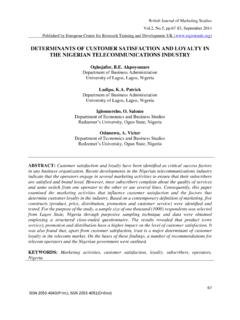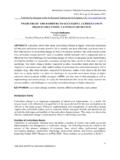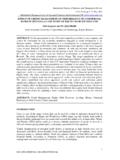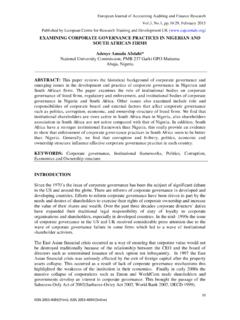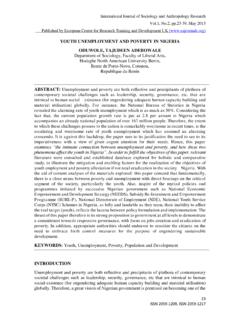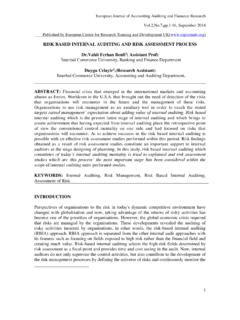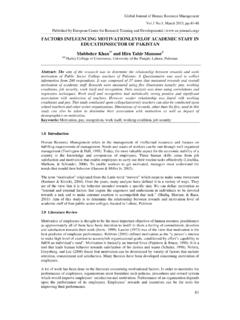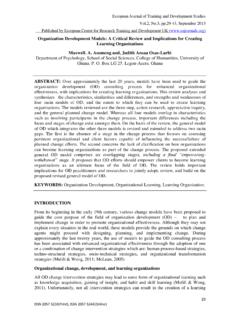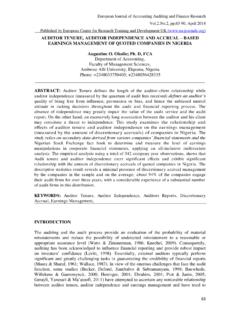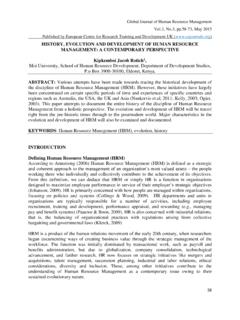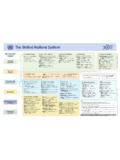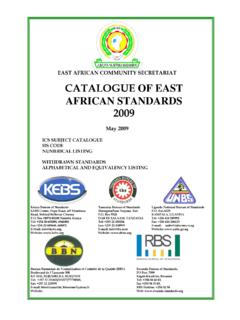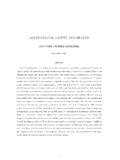Transcription of and Development in Rwanda: A Case Study of …
1 International Journal of Community and Cooperative Studies , , , June 2015 Published by European Centre for Research Training and Development UK ( ) 1 ISSN 2057-2611(Print), ISSN 2057-262X(Online) Savings And Credit Cooperatives (Sacco s) Services Terms and Members Economic Development in rwanda : a case Study of Zigama Sacco Ltd Tumwine Frank, Dr. Mbabazi Mbabazize, Dr. Jaya Shukla Department of Business Administration, School of Human Resource Development Jommo Kenyatta University of Agriculture and Technology, Kigali Campus ABSTRACT: The purpose of the Study was to find out the contribution of SACCO services terms on members economic Development using ZIGAMA as a case Study . The Study was based on three specific objectives, that is, to examine the nature of services terms at ZIGAMA, to assess the effect of savings services terms on members economic Development at ZIGAMA and to analyze the effect of credit services terms on members economic Development at ZIGAMA.
2 To achieve these objectives, the Study adopted a cross sectional, correlational and survey research designs. Data were collected through questionnaires, face to face interviews and observation methods. Data were analyzed by use of statistical methods, (descriptive statistics, Correlations and regressions analyses). The findings revealed that ZIGAMA attaches terms on its services which are annually reviewed by its board members. The services terms however are not properly communicated to members. Further, results indicated that savings services terms were moderately favorable to members and there was a strong positive and significant relationship between savings services terms and members economic Development and also a significant influence of saving services terms on members economic Development . Results also indicated that credit services terms were also moderately favorable to members and there was a strong positive and significant relationship between credit service terms and members economic Development and also a significant influence of credit service terms on members economic Development .
3 It was concluded that ZIGAMA had services terms in place but were not being communicated properly to members and their review was not involving all stakeholders. It was further concluded that SACCO s services terms significantly predict variations in members economic Development . Recommendations were that ZIGAMA should involve all stakeholders in the review of the service terms and the same terms should be properly communicated to all those concerned and should allow its members to withdraw their savings as needed and the minimum balancee should be friendly to the members. KEYWORDS: Savings And Credit Cooperatives (Sacco s) Services, Terms, Members , Economic Development , Zigama Sacco Ltd , rwanda : International Journal of Community and Cooperative Studies , , , June 2015 Published by European Centre for Research Training and Development UK ( ) 2 ISSN 2057-2611(Print), ISSN 2057-262X(Online) INTROUCTION The Study focused on Savings and Credit Cooperatives services terms and members economic Development in rwanda with ZIGAMA being the case Study .
4 This chapter presents the background to the Study , Statement of the problem, purpose of the Study , specific objectives, and research questions, significance of the Study , conceptual framework and scope of the Study and the definitions of key terms used in the Study . Background to the Study The savings and credit cooperative history started way back in 1938. At independence, only three SACCOs were registered. The savings and credit cooperative business embraced today arose in Bangladesh in 1976 with the founding of the Grameen Bank. It became popular in the 1980 s as a response of doubts and research in the state delivery of subsidized credit to poor farmers. According to ledger Wood (1998), prior to the 1980 s Government agencies were the predominant vehicles for providing productive credit to those with no previous access to credit facilities.
5 In rwanda the health of the financial sector had been impaired by the political and social factors Gatete (2000) and this indicates that the trouble of the 1970 s and early 1980 s produced a severe contraction of rwanda s monetary economy, a decline in financial intermediaries and loss of financial depth. In order to address the weaknesses in the economy and financial sector, the government of Uganda embarked upon an economic recovery program to put in place conditions to improve the incentive structure and business climate so as to promote saving mobilization and investment. Gatete (1999) indicates that the National Bank of rwanda developed a policy on SACCOS in the country where by the majority of the poor were put in safe and sound way. rwanda like any other Sub-Saharan country, the formal financial position is under developed, small and in financial super structure to mobilize financial resources for economic Development .
6 Given that SACCOS in rwanda have more to lose in case of default lending should be made available with minimum risk. This is in the line with Vogel s (1996) observation that it is the lender not the borrower who causes or prevents high level of delinquency in credit Cooperative movement in rwanda dates back to 1940 when the first farmers association was founded in response to the exploitative forces of middlemen the Asian traders and the colonial government, (Kyamulesire 1998). According to Kabuga (1987) the colonial administration arranged that the natives were to specialize in the production of export crops while the Europeans and their Indian allies were to concentrate on the processing and marketing of cash crops. The Africans had been denied opportunity to process, market and export as aliens reaped most of the rewards.
7 Co-operative savings and credit societies in rwanda have gained a wide recognition for the role of improving financial services to the low income households and thus contributing to economic Development . (Hulmes, 2000).It is an integral part of the country s financial system and should form an essential component of the financial system for increased savings mobilization, wider access to International Journal of Community and Cooperative Studies , , , June 2015 Published by European Centre for Research Training and Development UK ( ) 3 ISSN 2057-2611(Print), ISSN 2057-262X(Online) financial services and increased investments(Gatete, 2004).According to Kabuga et al (1995), Savings is an intelligent use of the economic resources that a member possesses to provide for the needs that may present themselves in the future. Savings in a SACCO should be a systematic process by which the member forms a reserve.
8 Savings serve as a basis to obtain credit in the society. By way of systematic savings a member demonstrates that he can pay his loan in a regular manner. This is one of the guarantees that a SACCO needs an order to be able to make a loan to a member. Financial cooperatives should make it possible for the poor to access reasonably priced credit and at terms and conditions that are favorable to them. Most of the low and medium income group who have no land tittles/security to offer and in absence of SACCOs,it would be difficult for them to access credit and would perpetually remain poor. Cooperatives empower people to fully raise their productive potential. Objectively, MFIs including SACCOs should provide services with favorable terms namely interest rates on savings, interest rates on loans, loan period, repayment schedule and loan size among other financial services to the existing small enterprises which are not start ups so that they can grow and add value to their owners and employees, create a savings culture and improve the national economy in general.
9 (Mutesasira 1999).Some MFIs have been successful in having small enterprises succeed especially in South America by Banco Sol and the Grameen Bank of Bangladesh where their programmes were able to improve the operations of Small enterprises in form of improved profitability, working capital and employment levels (Chander 1998).Other countries where MFIs have been successful include Chile, Peru,Brazil,Japan and Korea where credit programmes and their terms are deemed to have been effective in improving economic performance and Development (Dimtri, 1996).A SACCO is a cooperative financial organization owned and operated by and for its members according to democratic principles for the purpose of encouraging savings and using pooled funds to extend loans to members at reasonable rates of interest and providing financial services to enable members improves their economic and social are legal institutions registered under the Cooperative laws in rwanda (Cooperative statute, 1996 and Cooperative Regulations 1996).
10 SACCOs are owned by their members through payment of share capital and membership fees to the are formed to fight poverty through improving the members economic and social conditions by enabling them to access financial services and to fight exploitation of powerless individuals by the powerful individuals or institutions, by pooling their own resources to meet their needs. ZIGAMA, one of the biggest SACCOs in rwanda is a saving and credit cooperative society registered under the Cooperative Act. It is affiliated to rwanda cooperative saving and credit union (UCSU) and rwanda cooperative alliance (UCA). Accumulating wealth and uplifting income levels in the current global economic atmosphere is an innovative effort, one that calls for self sacrifice and determination. The institutional requirement to develop an appropriate medium through which the above can be achieved within RDF was met on September 22, 2005 with the establishment of ZIGAMA.
